
Cardiovascular Innovations and Applications
Scope & Guideline
Empowering healthcare professionals with the latest cardiovascular innovations.
Introduction
Aims and Scopes
- Cardiovascular Disease Mechanisms:
Research on the underlying biological mechanisms of cardiovascular diseases, including studies on genetic, molecular, and cellular pathways that contribute to conditions such as heart failure, arrhythmias, and atherosclerosis. - Innovative Therapeutic Approaches:
Exploration of new therapeutic strategies and technologies in cardiovascular medicine, including drug development, minimally invasive procedures, and advanced surgical techniques. - Diagnostic Advances:
Focus on novel diagnostic tools and methodologies, such as imaging techniques and biomarkers, to enhance the identification and management of cardiovascular conditions. - Patient-Centered Care and Outcomes:
Studies assessing the impact of various treatment modalities on patient outcomes, quality of life, and healthcare delivery in cardiovascular settings. - Epidemiology and Risk Factors:
Investigation of epidemiological trends, risk factors, and preventive strategies related to cardiovascular diseases, including lifestyle, genetic, and environmental influences.
Trending and Emerging
- Precision Medicine in Cardiovascular Care:
A growing body of research focuses on personalized treatment strategies based on genetic, biochemical, and clinical profiles, aiming to improve outcomes in cardiovascular patients. - Artificial Intelligence and Machine Learning:
The incorporation of AI and machine learning techniques in cardiovascular diagnostics and treatment is on the rise, with studies exploring their potential to enhance decision-making and patient management. - Integrative Approaches to Heart Failure Management:
There is an increasing trend towards holistic management strategies for heart failure, including the integration of pharmacological and non-pharmacological therapies, as well as lifestyle interventions. - Microbiome and Cardiovascular Health:
Emerging research is investigating the relationship between the gut microbiome and cardiovascular diseases, exploring how microbial balance can influence heart health. - Telemedicine and Remote Monitoring:
The use of telemedicine and digital health solutions for managing cardiovascular conditions, particularly in the context of the COVID-19 pandemic, is increasingly being recognized as a vital area of research.
Declining or Waning
- Traditional Surgical Techniques:
There is a noticeable decline in the publication of studies solely focused on traditional surgical techniques for cardiovascular interventions, as newer minimally invasive approaches gain traction. - Basic Science without Clinical Relevance:
Research that does not translate into clinical practice or lacks direct relevance to patient outcomes is becoming less common, as the journal emphasizes studies that connect basic science to clinical applications. - Non-Cardiac Comorbidities:
While still relevant, the focus on non-cardiac comorbidities, such as purely metabolic or endocrine disorders without direct cardiovascular implications, appears to be decreasing. - Static Risk Factor Analysis:
The publication of studies that merely reiterate known risk factors for cardiovascular diseases without offering new insights or interventions is on the decline. - Conventional Imaging Techniques:
The journal shows a reduction in studies centered on conventional imaging techniques, as there is a growing emphasis on advanced imaging modalities like 3D imaging and AI-assisted diagnostics.
Similar Journals
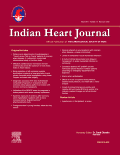
Indian Heart Journal
Championing Open Access to Cardiovascular InsightsIndian Heart Journal, published by Elsevier, is a distinguished peer-reviewed journal dedicated to the field of cardiology and cardiovascular medicine. Founded in 1961, this journal has been a pivotal resource for researchers, healthcare professionals, and students, providing a platform for innovative studies and insights into heart health. The journal transitioned to an Open Access model in 2013, ensuring widespread dissemination of vital research findings to enhance global understanding of cardiovascular diseases. Ranked in the Q3 category for Cardiology and Cardiovascular Medicine in 2023, it holds a reputable position in the medical community, with a Scopus rank of #222 out of 387 journals in the same field, placing it in the 42nd percentile. The Indian Heart Journal strives to foster advances in clinical practice and research while addressing the unique cardiac health challenges faced in India and beyond.
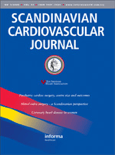
SCANDINAVIAN CARDIOVASCULAR JOURNAL
Elevating standards in cardiovascular healthcare and research.The Scandinavian Cardiovascular Journal, published by Taylor & Francis Ltd, is a distinguished peer-reviewed journal aimed at advancing the field of cardiology and cardiovascular medicine. With an impressive history dating back to 1967 and a forward-looking perspective until 2024, it has consistently contributed valuable research and insights, making it essential reading for anyone involved in cardiovascular healthcare. The journal holds a strong position in the academic community, reflected in its Q2 rating in both Cardiology and Cardiovascular Medicine, and a similar classification in the broader field of Medicine as of 2023. It is indexed in multiple databases, with a Scopus rank of #178 out of 387 in its category, placing it in the 54th percentile. The journal provides open access options, promoting wider dissemination of knowledge while supporting both researchers and practitioners dedicated to improving cardiovascular health. Its focus on high-quality, impactful research makes it an invaluable resource for professionals and students alike, keen to stay at the forefront of cardiology advancements.
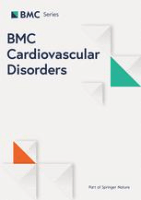
BMC Cardiovascular Disorders
Innovative insights for better patient care.BMC Cardiovascular Disorders is a premier open access journal dedicated to the field of cardiology and cardiovascular medicine, published by BMC, a leading publisher in the scientific community. Since its inception in 2001, this journal has provided a platform for high-quality research, showcasing innovative studies and critical reviews that contribute to the understanding and management of cardiovascular diseases. With an impressive impact factor and a rank in the Q2 category for 2023 within its field, BMC Cardiovascular Disorders stands at the forefront of cardiovascular research, enabling accessibility to a wealth of information that fosters collaboration and advancements in patient care. The journal's commitment to open access ensures that research is widely disseminated and easily accessible to researchers, practitioners, and students globally, enhancing the dialogue around cardiovascular health and disease prevention. Located in the United Kingdom, BMC Cardiovascular Disorders consistently aims to promote excellence in the study and treatment of cardiovascular conditions, encouraging the exchange of knowledge that ultimately benefits public health.
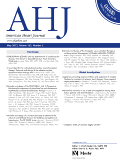
AMERICAN HEART JOURNAL
Elevating Heart Health Through Rigorous ResearchAMERICAN HEART JOURNAL, published by MOSBY-ELSEVIER, stands at the forefront of cardiovascular research, encompassing a vast array of studies focused on heart health, cardiology, and related medical therapies. Established in 1925 and set to continue its legacy into 2024, this esteemed journal holds a prestigious Q1 ranking in the category of Cardiology and Cardiovascular Medicine, reflecting its commitment to quality and significant influence in the field, as evidenced by its 85th percentile ranking in Scopus. With a dedicated readership of researchers, clinicians, and students, the journal serves as a critical platform for sharing groundbreaking findings, innovative techniques, and comprehensive reviews that strive to advance cardiovascular science. Although it does not currently offer open access, the AMERICAN HEART JOURNAL remains an indispensable resource for anyone invested in the evolution and improvement of heart health.
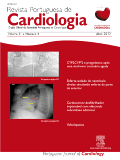
Revista Portuguesa de Cardiologia
Fostering collaboration and knowledge in the heart of cardiology.Revista Portuguesa de Cardiologia, published by Elsevier España SLU, stands as a pivotal resource in the realm of Cardiology and Cardiovascular Medicine. With its origins tracing back to 1970, this journal has cultivated a robust academic presence, achieving a 2023 Q3 ranking in its category, and currently holding a position of #220 out of 387 on the Scopus rankings, placing it within the 43rd percentile of its field. This open access journal, available since 2011, aims to disseminate high-quality research and insights relevant to contemporary cardiovascular issues. Its commitment to accessibility and knowledge exchange enhances its importance for clinicians, researchers, and students alike, fostering a more informed community in the fight against cardiovascular diseases. Operating from its base in Barcelona, Spain, the journal welcomes contributions that further the understanding and treatment of heart conditions, contributing significantly to the advancement of cardiovascular health.
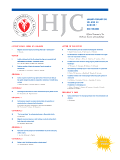
Hellenic Journal of Cardiology
Fostering a Community of Heart Health InnovatorsThe Hellenic Journal of Cardiology, a peer-reviewed open-access publication under the esteemed ELSEVIER banner, proudly represents the forefront of research in the field of Cardiology and Cardiovascular Medicine. Established in 1993 and actively publishing since then, this journal has carved a niche in disseminating high-quality research and clinical insights relevant to cardiovascular health in Greece and beyond. With an impressive Q2 ranking in both Cardiology and Cardiovascular Medicine categories as of 2023, the journal holds a commendable position at Rank #126/387 in Scopus, indicative of its critical role in advancing scientific knowledge and practice. The Hellenic Journal of Cardiology transitioned to open access in 2016, ensuring that ground-breaking research is freely accessible, fostering a global dialogue among researchers, clinicians, and students alike. Its publication frequency spans significant years, providing a continuous flow of innovative findings while addressing pressing cardiovascular issues. As the journal builds on its legacy, it aspires to enrich the academic community's understanding of cardiovascular medicine, making it an invaluable resource for anyone invested in heart health.
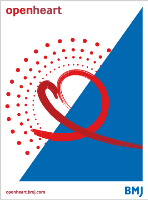
Open Heart
Transforming Cardiovascular Care with Every ArticleOpen Heart is a prestigious, peer-reviewed open access journal published by BMJ Publishing Group, focusing on the dynamic field of Cardiology and Cardiovascular Medicine. Launched in 2013, the journal has rapidly ascended to prominence, achieving a Q1 quartile ranking in its category as of 2023, reflecting its high-quality scholarly contributions. With an active publishing history from 2014 through 2024, Open Heart offers an expansive platform for researchers, clinicians, and students to disseminate and access groundbreaking research findings, reviews, and case studies that address critical issues in cardiovascular health. The journal is indexed in Scopus, ranking 133rd out of 387 in the Medicine - Cardiology and Cardiovascular Medicine category, placing it within the 65th percentile of its peers. Based in the United Kingdom, it promotes global research and collaboration in the cardiovascular domain, ensuring open access to vital knowledge for all stakeholders in the medical community. For access options and more information, visit the Open Heart website.

Reviews in Cardiovascular Medicine
Empowering healthcare through critical insights in cardiovascular medicine.Reviews in Cardiovascular Medicine is a prominent open-access journal dedicated to the comprehensive exploration and critical evaluation of current research, trends, and advancements in the field of cardiovascular medicine. Published by IMR PRESS since its inception in 2000, this journal has established itself as a key resource for both practitioners and researchers, aiming to bridge the gap between clinical practices and scientific inquiry. With an impact factor reflected in its Q2 ranking in Cardiology and Cardiovascular Medicine and a respectable position in the Scopus rankings (Rank #216/387), it caters to an audience keen on interdisciplinary approaches and innovative solutions in cardiology. As an Open Access journal since 2018, it ensures that its invaluable content is accessible to all, fostering the dissemination of knowledge crucial for advancements in healthcare practices. With its commitment to presenting high-quality review articles, Reviews in Cardiovascular Medicine plays an essential role in enhancing the understanding and management of cardiovascular diseases, making it an indispensable tool for professionals, scholars, and students alike.

Cardiology Journal
Exploring the future of cardiac science.Cardiology Journal, published by VIA MEDICA, stands as a prominent resource in the field of cardiology and cardiovascular medicine, with an ISSN of 1897-5593 and an E-ISSN of 1898-018X. Recognized for its Open Access model established since 1994, this journal facilitates widespread dissemination of critical research findings, allowing practitioners and researchers globally to access valuable insights without barriers. Based in Poland, with an address at UL SWIETOKRZYSKA 73, 80-180 GDANSK, it has achieved a respectable Q2 classification in 2023 for both Cardiology and Miscellaneous Medicine categories, reflecting its influence and quality within the scholarly community. With a Scopus ranking placing it at #117 out of 387 in Cardiology, it lies within the 69th percentile, underpinning its commitment to advancing knowledge in cardiovascular health. The journal’s converged years extending from 2006 to 2024 ensure it captures ongoing developments in a rapidly evolving field. As such, the Cardiology Journal serves as an indispensable platform for researchers, professionals, and students dedicated to exploring the frontiers of cardiac science and improving patient care.
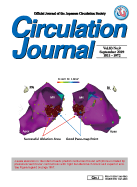
CIRCULATION JOURNAL
Empowering Cardiovascular Innovation Through Open Access.CIRCULATION JOURNAL, published by the Japanese Circulation Society, stands as a premier platform for cutting-edge research in the fields of Cardiology and Cardiovascular Medicine. With an impressive impact factor placing it in the Q1 quartile for both cardiology and general medicine, this journal is essential for researchers and practitioners seeking to stay at the forefront of cardiovascular science. The journal's accessible open access options ensure that groundbreaking studies are widely disseminated, reflecting its commitment to advancing medical knowledge and improving patient care. Since its inception in 1996, CIRCULATION JOURNAL has fostered a global dialogue on vital cardiovascular issues, making it a vital resource for academics, healthcare professionals, and students alike. With its base in Tokyo, Japan, the journal not only highlights regional advancements but also contributes significantly to the global medical community.